News
The 22nd of September marks the first official commemoration of the Remembrance Day for Victims of the Extermination of People with Psychiatric Disorders in Occupied Poland during the Second World War. This day was established by the Sejm of the Republic of Poland to honour the memory of those who perished in the criminal operation by the German occupiers known as Aktion T4.
On 10 September, to mark the National Day of Polish Children of War, the Museum of Polish Children – victims of totalitarianism, in collaboration with the Children of War Association in Poland, organised a commemorative ceremony at the Monument to the Martyrdom of Children, known as the “Broken Heart”, in Łódź.
On 10 September 2025, the Museum hosted a private view of its latest exhibition, “We, the People of Mosina. Past and present”, at its premises at ul. Piotrkowska 90.
1 August 2025 marks the 81st anniversary of the outbreak of the Warsaw Uprising. This unequal, 63-day struggle against the occupier resulted in thousands of deaths and the near-total destruction of the city. The aftermath saw further reprisals from the German authorities, who imprisoned both active and passive participants of the Uprising in concentration camps.
Join us for free museum activities this summer holiday. All activities will be held from Monday to Friday, 9 a.m. – 3 p.m.
The Museum of Polish Children – victims of totalitarianism invites professionals in tourism, tour guiding and guide services, as well as teachers interested in conducting classes on the Przemysłowa camp (for pupils over 12 years of age), to participate in a two-day seminar. The seminar aims to present the current state of scientific research on the history of the camp, the Museum's free educational activities and the educational route around the former camp site.
On 29 May 2025, the final gala of the Voivodeship History Competition, “We Were Just Children. Gehenna of Polish children during World War II.”, took place. The competition was open to pupils in 7th and 8th grades from primary schools in the Łódź Voivodeship. The event was held at the temporary premises of the Museum of Polish Children – victims of totalitarianism, located at Piotrkowska 90 in Łódź.
Invitation to participate in the 3rd scientific conference of the Museum of Polish Children – Victims of Totalitarianism: 80 years have passed. The situation of the child at the end of World War II and the first years of the post-war period (1944-1949)organized in Lodz on 20 November 2025.
The aim of the conference is to discuss the fate of children and adolescents in the final phase of the largest armed conflict in the history of mankind and the early years of the post-war period (1944-1949). The year 2025 marks the round 80th anniversary of the end of World War II. The historical and cultural policy of modern Europe remains oriented toward remembering those experiences and setting signposts to avoid a large-scale conflict in the years to come. At the same time, the war taking place at Poland's borders absorbs the attention of Europeans and forces critical reflection on the historical memory of societies. Against this background, the conference stirs up a renewed discussion on the fate of children and young people from areas occupied by the Third Reich and the USSR, for whom the end of the war was not only about regaining the desired freedom, but was also a period of new challenges related to, among other things, orphanhood, returning home, rebuilding family ties, gaining education and a profession, becoming independent, regaining a sense of security and improving health. The conference will also be a contribution to the consideration of the correlation between the problems of the youngest ones and the solutions implemented systemically by the new Polish authorities and an opportunity to assess the directions taken in connection with the change in the balance of power in post-war Europe, divided into two antagonistic blocs of states.
This Thursday, marking the 80th anniversary of the end of the Second World War, a ceremony commemorating the Children of War will be held at the Monument to the Martyrdom of Children – so called “Broken Heart” – in Szarych Szeregów Park in Łódź. The event will start at 11:00 a.m.
You are cordially invited to the Museum Night, which will take place on 17 May 2025. The event will begin at 6 p.m. at the temporary headquarters of the Museum of Polish Children – Victims of Totalitarianism at ul. Piotrkowska 90. Participants of the event will be able to visit exhibitions and take part in meetings with witnesses of history through VR technology.
On April 15, 2025, the three-stage Provincial Thematic Historical Competition "We were just children. Gehenna of Polish children during and after World War II” was finished. Participants in the competition demonstrated their knowledge of the policies of the German and Soviet occupiers in the Polish territories towards Polish society during World War II, as well as their knowledge of the history of the camp on Przemysłowa Street. Out of more than 300 young history enthusiasts who entered the competition, 6 students earned the title of winner and 8 became finalists.
Today, for the fourth time, the Little Way of the Cross event was held in Przemysłowa Street in Łódź, dedicated to the former prisoners of the German camp for Polish children. Following Holy Mass at the parish church of Holy Virgin Mary the Gracious, participants proceeded to the Monument to the Martyrdom of Children. The event was held under the patronage of the Museum of Polish Children – victims of totalitarianism.
On 19 March, ceremonies were held to commemorate the 82nd anniversary of the first transport of female prisoners to a branch of the German camp for Polish children in Przemysłowa Street in Łódź. The events took place at the Community Centre for Culture, Sports, Tourism and Recreation in Dzierżązna.
On September 10, 2023, we celebrated the National Day of the Polish Children of War for the first time. This is a tribute to the youngest citizens of the Polish state overwhelmed by the criminal activities of the German and Soviet occupiers. The Museum of Polish Children – Victims of Totalitarianism, retaining the memory and spreading knowledge of the fate of Polish children during World War II, encourages primary school students to participate in the competition enabling them to develop historical interests and perpetuate the values that were important to many generations of Poles and are still essential to the formation of the nation's identity, such as historical memory, community and responsibility.
On 1 March, we commemorate the Cursed Soldiers National Remembrance Day. This day was established in 2011 by the Sejm of the Republic of Poland to honour those who resisted the communist regime in the Polish anti-communist underground.
The Museum of Polish Children – Victims of Totalitarianism invites persons professionally associated with tourism and tour guide services and teachers interested in conducting classes about the camp on Przemysłowa Street (with students over 12) to take part in a two-day seminar intended to showcase the current state of research on the history of the camp, the offering of free educational activities of the Museum and the educational tour of the former camp site.
On 28-29 September this year, a scientific conference was held entitled "Childhood in wartime. Polish Children under German Occupation 1939-1945”. The event was organised by the Museum of Polish Children – Victims of Totalitarianism and the Łódź Cultural Centre. The scientific conference was supported by the National Reconstruction Plan. This is the second event of this kind in the Museum's history.
The 4th Reunion of the Survivors of the Przemysłowa Camp was held on 26-27 September.
This year's meeting of former inmates of the German concentration camp for Polish children at Przemysłowa Street in Łódź took place at the Artur Rubinstein Philharmonic Hall and the Łódź Cultural Centre. The event was supported by the National Reconstruction Plan.
19 September marked the 80th anniversary of the heroic death of Barbara Marta Nazdrowiczówna, a 15-year-old Warsaw Uprising messenger and scout of the 6th Warsaw Girl Scout Troop. On the occasion of the anniversary of the death of Basia, the College of Art and Design and the 59th Łódź Girl Scout Troop “Family” named after Barbara Marta Nazdrowiczówna organised a concert dedicated to Basia, entitled “Scouts’ Circle of Remembrance of the Warsaw Uprising”. The event took place on 19 September in the auditorium of the Academy of Film, Art and Design at 65 Targowa Street in Łódź.
On 17 September 1939, facing the Soviet aggression, Stanisław Siedlecki (1877-1939) committed suicide in Krzemieniec (now Ukraine). He was an independence and socialist activist, senator of the Second Polish Republic, precursor of the Promethean movement, promoter of co-operative activity and community worker, as well as chemical engineer.
On 10 September, we celebrate the National Polish Children of War Day, in connection with which the Museum of Polish Children – Victims of Totalitarianism organised a commemoration at the Monument to the Martyrdom of Children (Monument of the Broken Heart) in Łódź. The event was preceded by a Mass in the Archcathedral Basilica of St Stanislaus Kostka for the intention of Polish children – victims of totalitarian regimes.
The Museum of Polish Children – Victims of Totalitarianism invites you on 14 September 2024 to an educational walk around the grounds of the former camp on Przemysłowa Street in Łódź as part of the European Heritage Days 2024.
On 1 August 1944, at 'W' hour (5pm), the Home Army and other underground organisations took up arms against the German occupiers. Approximately fifty thousand insurgents fought to liberate Warsaw. Among the participants in the Warsaw Uprising there were also children and young people under the age of eighteen. Many of them gave their lives for a free Poland. “In the Łódź cemetery on Ogrodowa Street there is a grave of fifteen-year-old Basia Nazdrowicz aka Squirrel, who was killed in the Uprising,” explained Dr Ireneusz Piotr Maj, director of the Museum of Polish Children – Victims of Totalitarianism, in connection with the exhibition "Children's Traces of the Warsaw Uprising" prepared by the Museum staff.
Historians of the Museum of Polish Children – Victims of Totalitarianism have obtained further documents concerning the commandant of the camp for Polish children on Przemysłowa Street in Łódź, Camillo Ehrlich. This time it is Elisabeth Ehrlich's letters to the highest authorities in the GDR asking for her husband's pardon and release from prison.
We have obtained a document confirming the organizational subordination of the camp in Konstantynów Łódzki to the camp on Przemysłowa Street in Łódź.
The Museum of Polish Children – Victims of Totalitarianism is looking for artefacts related to the history of Polish children during World War II. The finds will go to the Collections Department of the Museum, where they can be duly protected and kept in suitable conditions.
On 27 May this year, in the temporary premises of the Museum of Polish Children – Victims of Totalitarianism, the final gala of the Provincial Historical Competition titled “We were only children. Gehenna of Polish Children During and After World War Two” took place. The competition was aimed at pupils in the seventh and eighth grades of primary schools from the Łódź Region. In addition to general knowledge of the times of German and Soviet occupation, the thematic scope included, in particular, issues relating to the fate of Polish children.
World War II mothers wanted to protect their offspring at all costs, often giving their lives for their children. These are the mothers who searched every day for the slightest trace of their children taken away by the occupying forces, never losing hope that they would soon be cuddled again. The 26th of May is Mother's Day in Poland and we wish to pay tribute to heroic mothers. One of them was Teresa Skibińska, mother of Wojciech and Jerzy Skibiński, former prisoners of the German concentration camp for Polish children on Przemysłowa Street in Łódź.
"Geheime Reichssache Kinderlager - Schicksale in Polen (Secret Affair of the Reich – Fates in Poland) is probably the only known foreign documentary concerning the camp for Polish children on Przemysłowa Street and the martyrdom of Polish children during the Second World War," explained Dr Ireneusz Piotr Maj, director of the Museum of Polish Children – Victims of Totalitarianism, in connection with the screening of the documentary at the Institute of History at the University of Łódź. The event was organised in cooperation with the Faculty of Philosophy and History of the University of Łódź.
On the initiative of the Museum of Polish Children – Victims of Totalitarianism, with the cooperation of the Governor of Łódź, the City of Łódź Office and the Archdiocese of Łódź, the tombstone of the late Zygmunt Olejniczak was renovated. Mr. Olejniczak was a prisoner murdered in the German concentration camp for Polish children on Przemysłowa Street in Łódź, buried at the St. Wojciech Cemetery in Łódź on Kurczaki Street. The official unveiling of the tombstone took place on 27 April 2024.
You are cordially invited to the Museum Night, which will take place on 18 May 2024. The event will begin at 6 p.m. at the Museum's headquarters at ul. Piotrkowska 90. Participants will be able to take part in a walk around the site of the former camp on Przemyslowa Street, visit exhibitions and watch films produced by the Museum of Polish Children – Victims of Totalitarianism.
“It has been 79 years since the end of the Second World War. There are only a few surviving witnesses of those events who can tell the youngest generation about their family history set in the dramatic realities of the German occupation of Polish lands,” said Dr Ireneusz Piotr Maj, director of the Museum of Polish Children – Victims of Totalitarianism, in connection with a meeting of Łódź youth with Wojciech Skibiński, a former prisoner of the camp on Przemysłowa Street.
On the 16th of April 2024, the final stage of the Provincial Historical Competition “We were just children. Gehenna of Polish children during and after World War II”, 2023/2024 edition, took place. Eight participants from seventh and eighth grades of primary schools in the Łódź Province carried out the competition tasks related to the camp on Przemysłowa Street, racial policy and settlement of the Third Reich, the children of the Warsaw Uprising, the deportation of Polish children to the USSR, and the persecution of the children of the Cursed Soldiers.
Roman Hrabar was born on 28 March 1909 in Kolomyia, then annexed to Austria. His parents were Stefan and Wanda Hrabara. He received a sound education, including piano lessons in Vienna.
On 22 March this year, the Little Way of the Cross dedicated to the former prisoners of the German concentration camp for Polish children on Przemyslowa Street in Lodz took place for the third time. Participants in the event set off from the parish of St Mary of Grace after the 7pm Mass. The event was co-organised by the Museum of Polish Children – Victims of Totalitarianism, which prepared a guide with reflections for the Stations of the Cross.
On 15 March this year, the District Centre for Culture, Sports, Tourism and Recreation in Dzierżązna held a celebration to commemorate the 81st anniversary of the first transport of prisoners to the branch of the German concentration camp for Polish children on Przemysłowa Street in Łódź.
1 March is the Cursed Soldiers National Remembrance Day. Consequently, the Museum of Polish Children – Victims of Totalitarianism has organised a meeting of young people from Łódź with Janusz Niemiec, the youngest political prisoner in the Polish People’s Republic as well as a representative of the Association of Children of Cursed Soldiers.
22 February 2024 was the date of the 2nd (regional) stage of the Provincial Historical Competition “We were just children. Gehenna of Polish Children during World War II and after” for elementary schools. Eighteen contestants took part in the competition organised thanks to the hospitality of the Public High School of the Łódź University of Technology. Due to the rules of the competition, not all of the pupils could qualify for the provincial stage. To the ones who, despite their vast knowledge, did not make it further during the regional stage, we would like to wish all the best in their other educational endeavours, and we hope that the seed of their passion for history – sown when they prepared for our competition – will be carefully nurtured. We would like to thank all the committed parents and the exceptional teachers we were lucky to meet during the competition.
The historians of the Museum of Polish Children – Victims of Totalitarianism have found photographs of former prisoners of the German concentration camp for Polish children on Przemysłowa Street in Łódź. However, many of the children shown in the photos are unknown. That is why we have started the campaign “The nameless ones – identifying the children from the camp on Przemysłowa Street” – announces dr Ireneusz Piotr Maj, the Head of the Museum.
On 28 February 2024, educators and historians of the Museum of Polish Children – Victims of Totalitarianism would like to invite the teachers of the humanities from elementary and secondary schools from Łódź and the Łódź Voivodeship to a conference dedicated to history and teaching methods entitled: “Child in the face of war on the example of the camp at Przemysłowa Street”. The event, conducted under the honorary patronage of the Museum of Polish Children, is organised by the Centre for the Development of Education in Łódź Voivodeship.
We warmly welcome everyone to avail of the opportunity we have provided for this year’s winter holidays. The theme of the activities is “Childhood then and now”.
On 19 January 2024, to celebrate the 79th anniversary of the closing of the German occupation in Łódź, at the Museum of Polish Children – Victims of Totalitarianism, there was a meeting with a witness of history, Mrs Barbara Paciorkiewicz, who, as a Polish child during WWII, was subject to Germanisation.
After the crew of the camp at Przemysłowa Street ran away, there were approx. 800–900 children who remained in the camp and were soon taken care of by nearby families from Łódź. Some of the children tried to reach their family homes, often located several hundred kilometres away. Unfortunately, some of those who reached their destination did not find any of their loved ones because they had died in German camps or prisons or had not yet returned from the forcible transfer to labour camps in the Reich – said dr Ireneusz Piotr Maj, director of the Museum of Polish Children – Victims of Totalitarianism, in connection with the celebration of the 79th anniversary of the closing of the camp at Przemysłowa Street.
On 14 January 1949, there was a trial before the regional court in Łódź acquitting the Pohl family (Jan, his wife, Janina, and their children, Mieczysław and Eugenia, the ill-famed guard at the camp at Przemysłowa Street in Łódź, the German concentration camp for Polish children), accused of signing the Volksliste during World War II. The legal basis for the proceedings was the decree of 28 June 1946, On the criminal liability for renouncing nationality during the 1939–1945 war, which was the last of the principal legislative acts by which the communist authorities tried to regulate this issue.
During the Second World War, forms of repression by the occupying forces took on a wide variety of forms, affecting many levels of not only public but also private life. For example, the German occupier banned people from being in public spaces by marking park benches, tram carriages or eating establishments with the sign Nur fϋr Deutsche (for Germans only), and marriages between the Polish and German people were banned. Children were also subjected to particular forms of repression.
How can you easily arrange an exhibition space in your school that will inspire your school community to carry out out-of-the-box historical or educational activities?
How do we get young people to learn about history told from the perspective of their peers?
We encourage you to rent the exhibitions of the Museum of Polish Children – Victims of Totalitarianism in Łódź free of charge.
We would like to invite you to a meeting with an exceptional witness to history - Ms Barbara Paciorkiewicz, whose story will stay in our hearts for a long time.
The Polen-Jugendverwahrlager der Sicherheitspolizei in Litzmannstadt (PJVL) was a type of German concentration camp for Polish children operating in occupied Łódź from December 1942 to January 1945. A branch camp was opened in Dzierżązna in March 1943, which - like the main camp - existed until January 1945. The camp's commandant was Saxon-born Friedrich Camillo Ehrlich, head of the German Criminal Police (Kripo) in occupied Łódź from January 1942 to January 1945.
“The stories reflected in the letters addressed to loved ones clearly show us the suffering experienced 80 years ago by Polish children from the German camp on Przemyslowa Street, while reminding us of the tragedy of Ukrainian children unfolding before our eyes,” said the Director of the Museum of Polish Children – Victims of Totalitarianism in connection with the vernissage of the exhibition “Two Wars – One Pain” / Дві війни - одне страждання, which took place on December 11 this year on the square in front of the Auditorium Maximum of Warsaw University.
On December 1, 2023, at the St. Wojciech cemetery in Lodz, in the presence of guests including Survivors of the German camp on Przemyslowa Street together with their families as well as family members of people murdered during the war and of inmates of the Lodz camps who died after the war, representatives of state, local government and church institutions, as well as residents of Lodz, a ceremony was held to unveil a monument to the Memory of Polish Children – Victims of German Camps in Lodz and the Surrounding Areas. The monument was initiated by the Museum of Polish Children – Victims of Totalitarianism.
“During preliminary research in foreign archives, in the National Collection of Aerial Photography in Scotland, the Museum’s historians found a series of photographs of Lodz taken from a Luftwaffe plane on August 12, 1944. Thanks to them, it was possible to develop an accurate plan of the camp, which differs from previously known reconstructions,” said Dr. Ireneusz Piotr Maj, director of the Museum of Polish Children – Victims of Totalitarianism, in connection with gaining access to new source materials.
“Our annual participation in the March is an expression of the will to preserve the memory of the most vulnerable victims of World War II,” said Dr. Ireneusz Piotr Maj, director of the Museum of Polish Children – Victims of Totalitarianism, in connection with the 10th March of Remembrance of the victims of the German concentration camp for Polish children on Przemyslowa Street in Lodz.
The dramatic stories of the youngest victims of war were told through the photographs and letters written by children, showing the brutal reality of war as confronted with children's helplessness and hopes – says Ireneusz Piotr Maj, PhD, Director of the Museum of Polish Children - Victims of Totalitarianism, in connection with the opening of the Museum's exhibition entitled "Let's hope my 'I love you' doesn't come too late".Children’s letters from the war. The opening of the exhibition took place on October 2, 2023, at the Polish Institute in Berlin.
"I clean the rooms and do some other jobs. Jerzy came from the hospital healthy, but now he is sick again with pneumonia and pleural fluid. I'm very worried that he might get worse." – we read in an excerpt from a child's letter from the camp on Przemysłowa Street. This and many other memoirs of Polish and Ukrainian children affected by the trauma of the war are on display at the latest exhibition of the Museum of Polish Children – Victims of Totalitarianism, titled "Two Wars – One Pain”.The opening of the exhibition took place on October 2, 2023 at Berlin's Washington Square. The exhibition was co-financed by the Minister of Culture and National Heritage.
“Polish children lost during the Second World War” – this was the title of a historical debate held as part of the Third Convention of Survivors of the Przemysłowa Concentration Camp. In addition to the debate, the two-day event also included a concert performed by the Symphony Orchestra of the Stanisław Moniuszko Music School Complex in Łódź, as well as a screening of the Museum's latest film entitled “Stolen Identity – Polish Children of War,” directed by Katarzyna Pełka-Wolsztajn.
"Heart in a Backpack," “Children of Warsaw" and "March of Mokotów" were just some of the patriotic songs heard during the concert titled “Scouts’ Circle of Remembrance of the Warsaw Uprising”. The event was dedicated to the memory of Basia Nazdrowicz, a liaison officer in the Warsaw Uprising and a scout of the 6th Warsaw Girl Scout Troop. The concert will be held on September 19 at 6 pm in the auditorium of the Academy of Film, Art and Design at 65 Targowa Street in Lodz.
“The arrests of Polish children from the town of Mosina on the 10th of September 1943 was not only a stage in their wartime ordeal. It is also a symbol of the policies of the German and Soviet occupiers, which were aimed at destroying Polishness by striking at what is most precious to the future of any national community, namely children. We must remember that this event was part of planned actions, the consequences of which included the fate of Polish children displaced, deported, Germanized, Russified and killed in camps and gulags. Children who heroically defended Warsaw and other Polish cities. Children who shared the fate of their parents, the Unbroken Soldiers”, said the Director of the Museum of Polish Children – Victims of Totalitarianism in connection with the celebration of the National Day of Polish Children of War, held for the first time on the 10th of September this year.
"In September 1943, I was arrested. I was still a minor at the time, and so I was sent to a camp for minors in Lodz, along with 50 other children from Mosina. For me, it was a harrowing experience, also due to the fact that my parents and sisters had been arrested the day before. I remember that the Germans came for me at 9 a.m., gathered us in one of the halls in Mosina, then took us by truck to Poznan, and then to Lodz," said Kazimierz Cieslewicz, a former prisoner of the camp on Przemyslowa Street. This is one of the many quotes that can be found on the boards of the Museum's latest exhibition. The opening of the exhibition was held on August 30 this year in the building of the Parliament of the Republic of Poland.
“Calm, objective and full of humor, with his knowledge and perseverance he won the respect of both superiors and subordinates. Warsztaty (the Workshop) unit under his lead became compact, focused mainly on combat training, meticulously supervised by Dąbski” – this is how Lesław Bartelski described Zdzisław Dąbski, co-founder of the Home Army Regiment “Baszta” (the Turret) and a second lieutenant in the reserve, in a book titled Pułk AK Baszta (Home Army Regiment Baszta).
Children’s Martyrdom Monument, assembly yard, quarantine station or atelier are just some of the sites at the former German concentration camp for Polish children on Przemyslowa Street in Lodz. As of today, you can take a virtual walk through the most important sites related to the history of the camp, via the Museum's official website.
“Once, a sick five-year-old boy was brought to the hospital. His mother by his side. He was already dying. The mother, I noticed, was restless and embarrassed to say that the child had not been baptised. Looking at the child, I saw that the boy was moribund but could not die. I took some water, baptised him and the child died so peacefully" – we read in the memoirs of Sister Stefania Fiodorczuk, who ministered in the orphanages for the Children of Zamość. Many similar testimonies are to be found on the boards of the latest exhibition of the Museum of Polish Children – Victims of Totalitarianism, titled “They Will Drive Us Out and Kill Us. The Fate of the Children of the Zamość Region on the 80th Anniversary of the Zamość Operation".
On 13 July 2023, during the 79th session of the Sejm of the Republic of Poland, the National Day of the Polish Children of War was established. The date of 10 September was chosen to celebrate the new holiday, referring to the tragic events in Mosina of 1943. The idea for the date came from the Museum of Polish Children – Victims of Totalitarianism.
“The online database of Polish children imprisoned in the German concentration camp on Przemyslowa Street was created in response to appeals from their families. We are being contacted by relatives of Survivors or children murdered in the camp who, so far unsuccessfully, have been searching for any information about their loved ones,” explained Dr. Ireneusz Piotr Maj, director of the Museum, in connection with the launch of the database of former prisoners of the Przemyslowa camp.
“Thanks to the initiative taken by the Museum of Polish Children - Victims of Totalitarianism, Polish children who lost their lives during World War II will be commemorated with dignity. The monument, which will soon be erected at the St. Wojciech Roman Catholic cemetery in Lodz, will be a place reminding us of the tragedy of the youngest victims of totalitarian Germany,” explains Dr. Ireneusz Piotr Maj, the director of the Museum, in connection with the announcement of the best designs for the monument dedicated to Polish children, victims of German crimes in Lodz.
During a session of the Sejm's Culture and Media Committee, members of parliament approved an act on establishing September 10th as National Day of Polish Children of War. The session was attended by Ireneusz Piotr Maj PhD, who gave statement of reasons for the date of September 10th suggested by the Museum of Polish Children - Victims of Totalitarianism as the most appropriate date for the celebration of the National Day of Polish Children of War.
The sight of a grisly murder of a child by the German occupant or death in a gas chamber was the tragic fate of many Polish mothers during WWII. The situation was quite different in the Third Reich, where German mothers with many children received the Cross of Honour of the German Mother (German: Ehrenkreuz der Deutschen Mutter) from Adolf Hitler.
We cordially invite you to the Night of Museums, which will take place on May 13, 2023. The event will begin at 6 p.m. in the Museum at 90 Piotrkowska Street.
On the initiative of the Museum of Polish Children – Victims of Totalitarianism, a monument to Polish children who were victims of German crimes will be erected at the St. Wojciech Catholic Cemetery in Łódź. The construction of the monument will be financed by the Ministry of Culture and National Heritage. PGE Polska Grupa Energetyczna S.A. – the Museum's patron – has also pledged its support. On April 20, a press conference was held in the Museum to announce the open competition for the design of the monument.
Cooperation in organising exhibitions, conferences, publications and joint research are the main premises of the agreement between the Museum of Polish Children – Victims of Totalitarianism and the Jan Karski Institute for War Losses. The agreement was signed on 4 April 2023 at the Museum.
A Little Way of the Cross dedicated to the former prisoners of the German concentration camp on Przemysłowa Street in Łódź set out from the parish of St. Mary of Grace in Łódź on March 31. Stations of the Way of the Cross are located on the site of the former camp. Participants began the penitential service after the 8 p.m. Mass. The Little Way of the Cross was under the patronage of our Museum.
The Academy of Social and Media Culture (AKSiM) in Toruń is another institution with which the Museum has recently established cooperation. One of the terms of the agreement is the organisation of competitions for students of the Toruń-based academy. The forthcoming competition will concern the preparation of short films about the German concentration camp for Polish children in Łódź.
Archive workshops for young historians and the participation of students in selected historical source material searches are the most important points of the cooperation agreement signed between Muzeum Dzieci Polskich – ofiar totalitaryzmu [eng. the Museum of Polish Children – Victims of Totalitarianism] and the Public High School of the Łódź University of Technology.
"Some Germans, SS men from the camp staff, working in leading positions, maintained constant terror – they beat and tortured prisoners. I have in mind here the notorious August (...). He would beat the prisoners not only at work, but he would come after the assembly, order you to lie down or assume a certain position and he would torture you," reads the testimony of Stefan Marczewski, a former prisoner of the camp on Przemysłowa Street. The profile of Edward August (a camp guard) and the latest findings of the Museum's historians were presented at a press conference on 23 March 2023.
"Zapłakana Polska" [eng. "Weeping Poland"], "Nielegalne kwiaty" [eng. "Illegal Flowers"], "Sierpniowa piosenka" [eng. "August Song"], "Taki kraj" [eng. "Such a Country"] and "Żeby Polska była Polska [eng. "Let Poland Be Poland"] are the titles of just some of the songs heard today during Jan Pietrzak's concert at the All Saints' Church in Gieczno.
"I lived and worked in a hole near the mill. Together with other girls I collected stones, harvested potatoes and worked in the house of the owner of the Fuge estate. For minor offenses we were punished in such a way that we were sent to dig up tree stumps, were not given supper, were locked in the cellar..." recalled Danuta Kęsik, a former inmate of the Dzierżązna sub-camp. This is one of the quotes you will be able to read on the board of the Museum's new open-air exhibition entitled "Only work and hunger. The history of a branch of the German concentration camp for Polish children." The opening of the exhibition took place on March 17 this year in the manor park in Dzierżązna.
The memorial plaque, which was unveiled at the Łódź Board of Education, is an expression of our remembrance of the youngest victims of German crimes in Łódź. We know that the subject of the German concentration camp for Polish children on Przemysłowa Street is very important, especially from an educational point of view. By addressing this issue, we are meeting the need to supplement the core curriculum in history," said Dr. Ireneusz Piotr Maj, Director of the Museum of Polish Children – Victims of Totalitarianism.
"As part of the procedure for admission to the camp, the children had their heads shaved. They were stripped of their civilian clothes. In return, they received gray denim uniforms – a sweatshirt, pants and cap for the boys and a dress and sweatshirt for the girls. Instead of shoes, the children were given wooden clogs," reads the Museum's publication "An Extraordinary Polish Family. The story of Gertruda Nowak – a child from the camp on Przemysłowa Street", which was presented together with an exhibition of the same name on March 9 in Gminny Centrum Kultury, Sportu, Turystyki i Rekreacji [eng. the Municipal Center of Culture, Sport, Tourism and Recreation in Dzierżązna].
"It doesn't end there... The story of the childrens’ camp on Przemysłowa Street" and "Geheime Reichssache Kinderlager Schicksale in Polen” are the titles of the films presented today by the Museum of Polish Children – Victims of Totalitarianism during a screening at the Łódź Cultural Center.
On March 2 this year, Muzeum Dzieci Polskich – ofiar totalitaryzmu [eng. Museum of Polish Children – Victims of Totalitarianism] hosted a meeting of high school students in Łódź with Mr. Janusz Niemiec-Żubryd, a representative of Stowarzyszenie Dzieci Żołnierzy Wyklętych [eng. Association of Children of Cursed Soldiers], also known as the youngest political prisoner of the Stalinist era in Poland.
Janusz Niemiec-Żubryd was born in 1941. He was the son of Antoni Żubryd, a commander of the Independent Operational Battalion of the National Armed Forces (NSZ), alias “Zuch”. In June 1945, at the age of four, he and his grandmother were arrested for the first time by the Security Office. He was released a few days later, however, after his father issued an ultimatum to the communist authorities, threatening to execute seven captured Civic Militia officers if his son and mother-in-law continued to be detained. In 1946, after the Security Office agent Jerzy Vaulin carried out the assassination of the Żubryds, their son Janusz was arrested again by the Security Office, making him the youngest political prisoner of the Stalin era in Poland.
Cooperation regarding the distribution of films produced by Muzeum Dzieci Polskich – ofiar totalitaryzmu [eng. Museum of Polish Children – Victims of Totalitarianism] by Łódzki Dom Kultury [eng. Łódź Cultural Center] is the main objective of concluding a cooperation agreement between the two institutions. The signing of the letter of intent for the implementation of joint activities took place on February 28, 2023 at the Museum at 90 Piotrkowska Street in Łódź.
A screening of the documentary films “To się nie kończy... Historia dzieci z obozu na Przemysłowej” ["It doesn't end there… The story of children from the camp on Przemysłowa Street"] and "Geheime Reichssache Kinderlager Schicksale in Poland" will take place at 6 pm on March 3 at Łódzki Dom Kultury. If you wish to attend the event, please sign up by email: filmy@muzeumdziecipolskich.pl. Admission to the screening is free.
"I was so exhausted that I cried and prayed for death," wrote Halina Cubrzyńska-Kryszkiewicz, a former inmate of the camp on Przemysłowa Street, in her memoirs. Similar quotes can be found at the Museum's exhibition “Nauczono nas płakać bez łez...” ["We were taught to cry without tears..."], which was presented today in the main square of Zgierz. The event is part of a series of commemorations marking the 80th anniversary of the establishment of a branch of the camp for Polish children in Dzierżązna. The exhibition was followed by a historical debate at the Zgierz Municipality Office.
“I find it hard to understand how Eugenia Pol could hide two, so drastically different faces. Working at a day care facility, she was an unflawed and kind person. She was so caring towards children (…). This is beyond my comprehension that, a few years back, Eugenia Pol was capable of doing so terrible and cruel things to kids as a guard at a concentration camp for Polish children,”said Marianna Tomasik, who had worked at the same nursery as Eugenia Pol, in her conversation with a historian.
“On 10.09.1943, my entire family was arrested by the Gestapo and deported to concentration camps. Together with my sister and brother, I was sent to a camp for Polish children and adolescents on Przemysłowa Street in Łódź," said Janina Bajroszewska, the youngest former inmate known by name of the camp on Przemysłowa Street in Łódź, thanks to the Museum historians' research.
Today marks the 80th anniversary of the demonstration funeral organized by residents of Siedlce for the "Children of Zamojszczyzna" who died during one of the transports.
On 19 January 2023, the Museum of Polish Children – Victims of Totalitarianism entered into a cooperation agreement with the Łódź Board of Education. The institutions will undertake joint activities to promote knowledge about the tragic fate of children imprisoned in the German concentration camp on Przemysłowa Street in Łódź. The main idea behind the agreement is the organisation of historical competitions and the promotion of the Museum's first multimedia exhibition „Mamo czemu nie przyjeżdżać? Listy dzieci z obozu na Przemysłowej” [“Mother, why aren't you coming?
“In the last days of the camp, we were terrified. We were afraid that the Germans would kill us, so we hid under the lower bunks (...). On the last day after waking up, when I went outside, I noticed that there were no guards on the camp grounds," recalled Henryk Łyszkowicz, a former prisoner of the camp on Przemysłowa Street, in an interview with Dr. Ireneusz Piotr Maj, director of the Museum.
“The issue of a stamp dedicated to the German concentration camp for Polish children in Łódź is further evidence of our remembrance of the victims of this place. The tragedy of the minor prisoners, for which the German occupiers were responsible, requires that we talk about it," stressed Dr. Ireneusz Piotr Maj, Director of the Museum, in connection with the presentation of the postage stamp "German camp for Polish children in Łódź (1942-1945)". The event took place on the eve of the 78th anniversary of the end of the camp on Przemysłowa Street.
A music video for the song "The Children from Przemysłowa Street" has just been released. The song, performed by Czeslaw Mozil and the choir and orchestra of the Stanisław Moniuszko Music School Complex in Łódź, promotes the Museum's latest documentary film, "It Doesn't End There... The Story of the Children from the Camp on Przemysłowa Street".
The 11th of December 2021 marks the 79th anniversary of the first transport of the little prisoners to the German concentration camp for Polish children on Przemysłowa Street in Łódź. On that day, the 25-month period of the torment of the youngest victims of the Nazi regime started.
This touching animated film tells the story of a little girl who is taken from the present to the German concentration camp for Polish children on Przemysłowa Street in Łódź, where her fate could have been changed forever.
On the 1st of December 2021, 79 years have passed since the establishment of the concentration camp for Polish children in Łódź. Those who managed to survive it had to endure the psychological and physical anguish from the trauma they had experienced in the camp for many years after the war ended. To commemorate these events, the museum organised a solemn meeting with the participation of the survivors themselves, featuring a premiere of the historical fiction film, Nauczono nas płakać bez łez… (“We Learned to Cry Without Tears”), and a publication bearing the same title.
Historians from the Museum of Polish Children - Victims of Totalitarianism have discovered the burial places of child victims of the German concentration camp in Łódź that had previously remained unknown. The tormented Polish children were buried at the St. Wojciech Roman Catholic Church in Łódź. So far, the researchers have managed to locate 77 such locations. Two graves have remained intact, while the burial places of the other 75 victims are now the graves of other people. The decision on further steps will be made by the Institute of National Remembrance.
Hunger, humiliation, pain and death from exhaustion – it is hard to imagine the endless suffering of the child prisoners of the camp in Łódź on Przemysłowa Street. We are obliged to make sure that this tragedy will never be forgotten.
We have the first school visit behind us! The classes, prepared by a team of educators and historians from the museum, help youths learn the history of their city and the fate of children who were held prisoner in the German camp on Przemysłowa Street.
A unique journey for more memories. In Mosina, we met survivors of the Przemysłowa Street camp – Bohdan Kończak and Wojciech Skibiński – and their families.
"Please send me some grey soap and a spoon because I have nothing to eat with. Please send me some saccharin and fry me 20 pancakes, Mummy..."
The significance of the recently found letters of children from the Przemysłowa Street camp was discussed during today's press conference by the Head of the Museum, Ireneusz Maj (PhD) and Andrzej Janicki (PhD).
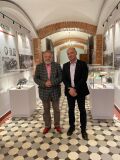
We are beginning cooperation with the Museum of Cursed Soldiers and Political Prisoners of the Polish People's Republic! Thanks to the courtesy of the host – Jacek Marian Pawłowicz, the Head of the aforementioned museum – our Head of the museum, Ireneusz Maj, had an opportunity to familiarise himself not only with the collections of the museum in Warsaw, but also with the experience of its team.
Thank you. We thank our wonderful guests – the former prisoners of the Przemysłowa Street camp – for this meeting, a wonderful time and for all of the great emotions and memories. It was an invaluable source of knowledge. At the same time, we want to thank the friends of the museum for their presence and support during these two days. We know how important you consider our work to be because history is something that needs to be remembered.
Today marks an important date in the history of Łódź – the 77th anniversary of the liquidation of Litzmannstadt Ghetto. During the celebrations commemorating this event, Ireneusz Maj (PhD), Head of the Museum of Polish Children – Victims of Totalitarianism, laid flowers and read a letter addressed to the ceremony’s participants on behalf of Professor Piotr Gliński (PhD), Deputy Prime Minister and Minister of Culture, National Heritage and Sport.
We are at the end of the road of life. (...) we have no time left for the future – the survivors, former prisoners of the German concentration camp for Polish children, urge the authorities of the city of Łódź to transfer a building in aid of the museum.


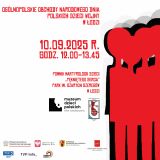
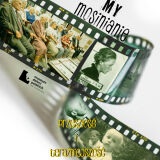
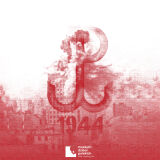
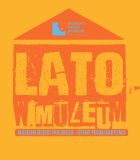
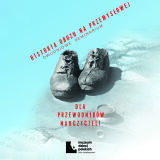

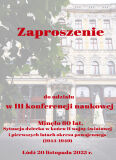
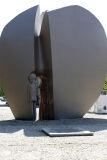
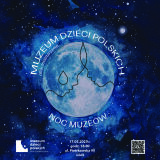
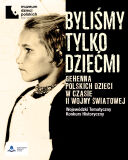
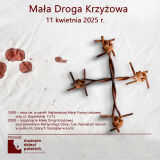
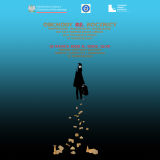


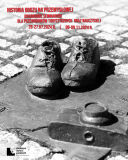
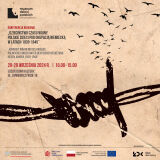
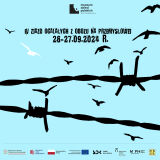
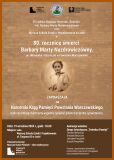

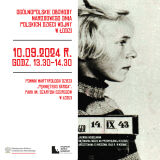

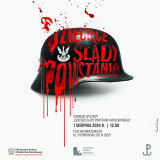

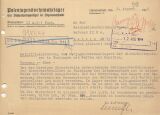
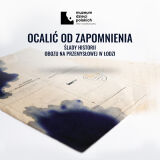

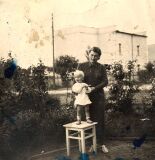
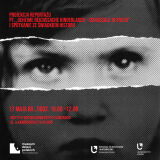
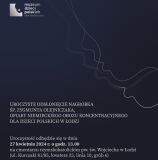
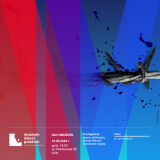
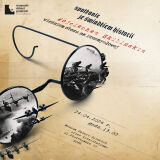





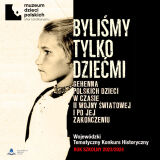
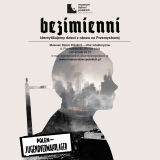
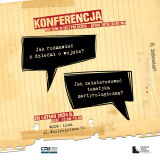
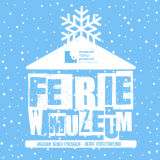
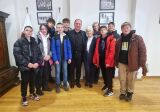



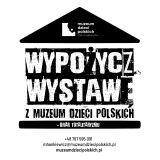





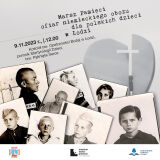
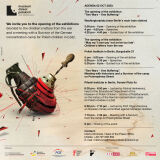

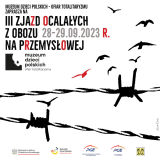
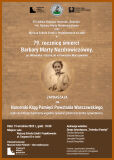







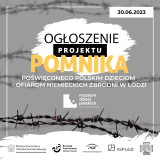

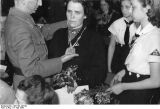
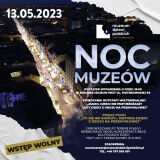

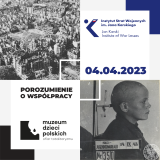
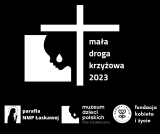
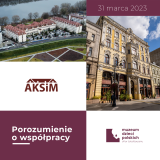
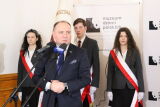










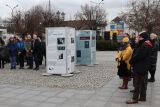
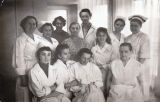









![Graves of children – victims of the German camp – have been found [NL]](f/konferencja-26.11.21-2_s10.jpg)








